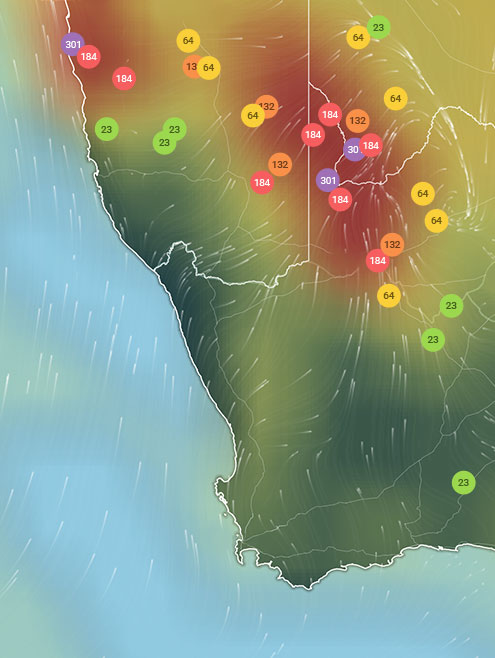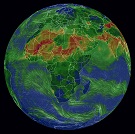Get a monitor and contributor to air quality data in your city.
5.7K people follow this city






AIR QUALITY DATA CONTRIBUTORS
Find out more about contributors and data sources| Index | Very high | ||
| Tree pollen | Very high | ||
| Grass pollen | None | ||
| Weed pollen | None |
| Weather | Broken clouds |
| Temperature | 59°F |
| Humidity | 57% |
| Wind | 1.8 mp/h |
| Pressure | 30 Hg |
| # | city | US AQI |
|---|---|---|
| 1 | Ibiza, Balearic Islands | 88 |
| 2 | Alacant, Valencia | 83 |
| 3 | Elche, Valencia | 78 |
| 4 | Fortelasa de Isabel II, Balearic Islands | 76 |
| 5 | Palma, Balearic Islands | 68 |
| 6 | Sa Pobla, Balearic Islands | 67 |
| 7 | Sevilla, Andalucía | 65 |
| 8 | Castello de la Plana, Valencia | 63 |
| 9 | Santiago de Compostela, Galicia | 62 |
| 10 | Almería, Andalucía | 60 |
(local time)
SEE WORLD AQI RANKING
| # | station | US AQI |
|---|---|---|
| 1 | San Basilio | 50 |
| 2 | CLINICAS COC | 12 |
(local time)
SEE WORLD AQI RANKINGUS AQI
39
live AQI index
Good
| Air pollution level | Air quality index | Main pollutant |
|---|---|---|
| Good | 39 US AQI | O3 |
| Pollutants | Concentration | |
|---|---|---|
| PM2.5 | 6.5µg/m³ | |
| PM10 | 22µg/m³ | |
| O3 | 94.6µg/m³ | |
| NO2 | 44µg/m³ | |
| SO2 | 2.7µg/m³ | |
PM2.5
x1.3
PM2.5 concentration in Murcia is currently 1.3 times the WHO annual air quality guideline value
| Enjoy outdoor activities | |
| Open your windows to bring clean, fresh air indoors GET A MONITOR |
| Day | Pollution level | Weather | Temperature | Wind |
|---|---|---|---|---|
| Wednesday, May 1 | Good 45 AQI US | 69.8° 53.6° | ||
| Thursday, May 2 | Moderate 52 AQI US | 71.6° 50° | ||
| Friday, May 3 | Moderate 51 AQI US | 75.2° 55.4° | ||
| Today | Good 39 AQI US | 84.2° 59° | ||
| Sunday, May 5 | Good 18 AQI US | 86° 64.4° | ||
| Monday, May 6 | Good 13 AQI US | 84.2° 68° | ||
| Tuesday, May 7 | Good 14 AQI US | 75.2° 62.6° | ||
| Wednesday, May 8 | Good 13 AQI US | 73.4° 59° | ||
| Thursday, May 9 | Good 9 AQI US | 75.2° 57.2° | ||
| Friday, May 10 | Good 15 AQI US | 78.8° 59° |
Interested in hourly forecast? Get the app
Murcia is a city in south-eastern Spain, the capital and most populous city of the autonomous community of the Region of Murcia. According to a census conducted in 2018, Murcia had an estimated population of approximately 450,000 people. This ranks it as the seventh largest city in the country. This number increase to 690,000 when the entire metropolitan area is taken into consideration. It is located in the south eastern sector of the Iberian peninsular on the banks of the Segura River.
At the beginning of 2022, Murcia was going through a period of air quality that was classified as being “Unhealthy for sensitive groups” with a US AQI reading of 119. This United States Air Quality Index number is calculated using the levels of six of the most prolific air pollutants, such as nitrogen dioxide, sulphur dioxide, ozone, carbon monoxide and both sizes of particulate matter, which are PM2.5 and PM10. It can then be used as the metric when comparing air quality in other cities around the world. If data is unavailable for all 6 pollutants, a figure can still be calculated by using what figures there are. There were five of the major pollutants measured in Murcia which were; PM2.5 - 42.7 µg/m³, PM10 - 55 µg/m³, ozone (O3) - 8 µg/m³, nitrogen dioxide (NO2) - 21 µg/m³ and sulphur dioxide (SO2) - 2 µg/m³.
This level of PM2.5 is just over four times over the recommended safe level of 10 µg/m³ as suggested by the World Health Organisation (WHO) as being an acceptable level. Although no amount of air pollution is considered to be safe.
When air pollution is from this “Unhealthy for sensitive groups” bracket the given advice would be to remain indoors as much as possible, closing doors and windows to prevent the ingress of more polluted air. The operation of an air purifier would be beneficial if one is available but ensure it is set the recirculate the existing air and not import more dirty air from outside. Those who are more sensitive to poor quality air should avoid venturing outside until it improves. If this is unavoidable, then a good quality face mask should be worn at all times. All types of outdoor exercise should be avoided until the air quality improves. There is a downloadable app from AirVisual.com which is suitable for all operating systems and gives the latest information regarding air quality in real-time.
Looking back at the 2020 figures published by IQAir.com, it can easily be seen that the months of April and September returned air quality readings from the “Good” category with respective figures of 10.2 and 11.4 µg/m³. The remaining ten months of the year saw quality from the “Moderate” group with readings between 12.1 and 35.4 µg/m³. Overall. The dirtiest month was January with a figure of 28.9 µg/m³. There were no records of air quality held before 2020 when the annual average reading was 16.1 µg/m³. This low figure was to be expected because it may have been affected by the COVID-19 pandemic as many vehicles were no longer in daily use because the offices were closed, in an attempt to halt the spread of the virus. Many factories and non-essential production units were also required to close which removed their emissions from the atmosphere, albeit on a temporary basis. Worldwide, cities reported a much better quality of air due to the general lack of traffic pollution in city centres due to the pandemic.
As with most large cities throughout the world, the main source of air pollution comes from the increasing number of vehicles using the city streets on a daily basis.
An increase in agricultural burning has also been detected, especially in Mazarrón, Águilas, Cieza and Murcia. In the specific case of Murcia, 177 complaints have been registered, which is "more than double compared to previous years."
Ecologists in Action Murcia Region has publicly denounced that the municipalities of Murcia, Cartagena and Lorca "do not comply" with the new air quality guidelines of the World Health Organisation (WHO), for which they demand from the municipalities "a drastic reduction and of current urban traffic in favour of pedestrians, bicycles and collective transport, if they really want to protect the health of their citizens”.
The recommended annual concentration of nitrogen dioxide (NO2), a toxic pollutant whose main source in cities is motorised traffic, has gone from 40 to 10 micrograms per cubic metre.
Nitrogen dioxide causes around 7,000 premature deaths each year in Spain, according to the Carlos III Health Institute and the European Environment Agency. “It is an irritating gas that causes respiratory diseases such as asthma and chronic obstructive pulmonary disease (COPD), and lowers resistance to infections.
The municipalities must protect the health of their citizens, must quickly and ambitiously implement the Low Emissions Zones (ZBE) to which the Climate Change Law obliges them before 2023, reducing drastically urban traffic and promoting local shopping, teleworking, electronic administration or staggering working hours, in addition to promoting electric collective transport and active pedestrian and cycling mobility, redistributing urban space to the benefit of these media.
Contaminated air contains invisible material. Inhalation of soot or smoke containing particulate matter, often referred to by its size in micrometres, PM10 and PM2.5, blackens the lungs, causes respiratory and heart problems, and diseases such as asthma and cancer.
Some PM10 is visible as a cloud, and like PM2.5 it affects visibility by scattering and absorbing light, but you need a microscope to see PM2.5. The smaller the particle, the deeper it can get into the lungs, along with the chemicals it's made of. This type of air pollution arises from the incomplete combustion of wood and plants, as well as fossil fuel, dust, and combinations of other pollutants from various sources.
Air pollution is the main cause of diseases of various kinds. Its association with respiratory pathologies (lung cancer, allergies, pneumonia) is well known, but its damage also affects heart health. Heart failure, arrhythmias, stroke... are worsened by the poor quality of the air we breathe, which already causes more deaths for cardiovascular reasons than high cholesterol, being overweight or being sedentary. In addition, it is considered the fourth risk factor causing more mortality due to heart and blood vessel reasons, only behind hypertension, smoking and poor diet.
3Contributors
2 Government Contributors
1 station
Anonymous Contributor

1 station
4 Data sources